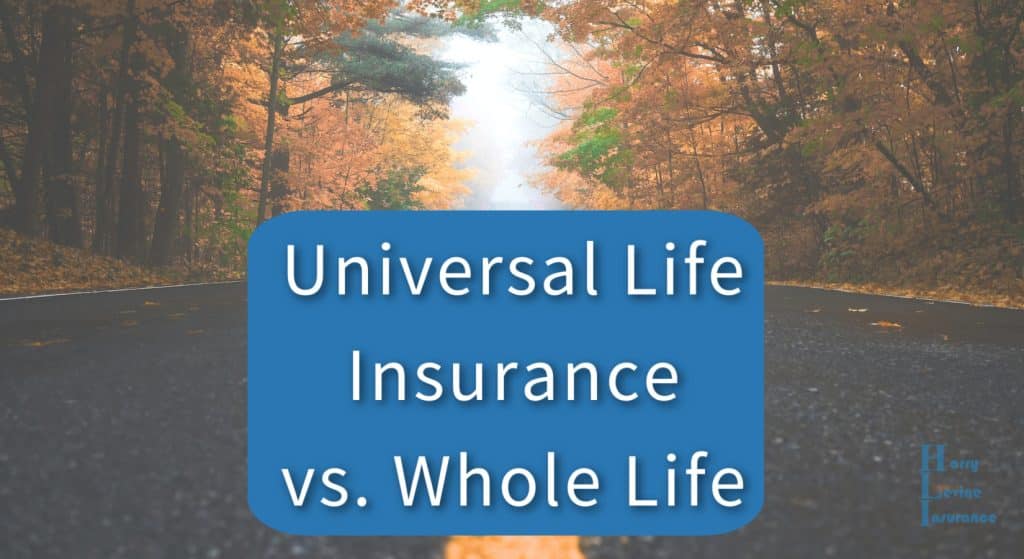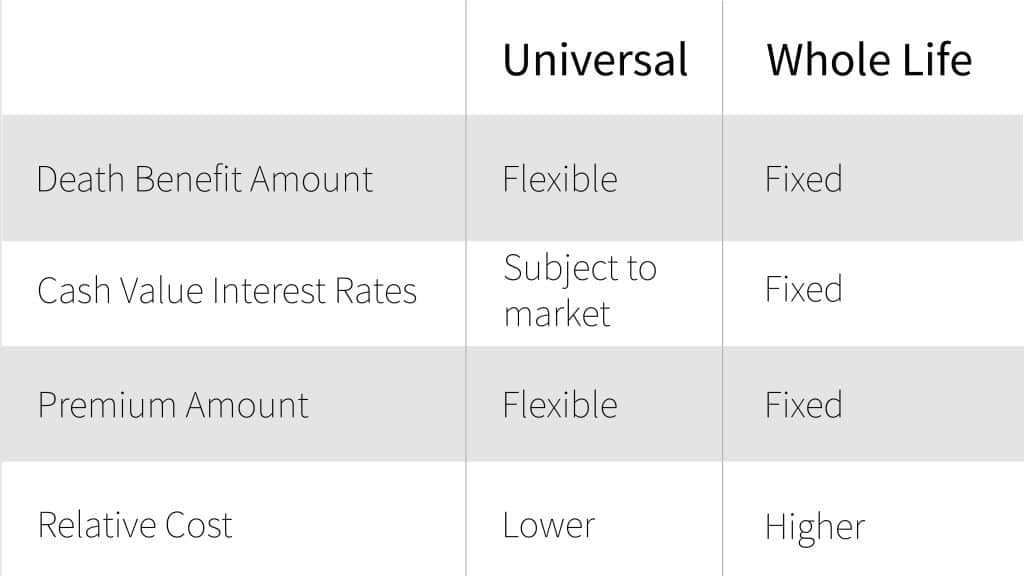Need lifelong insurance coverage?
Let’s take a closer look at universal life insurance vs whole life.
Finding ways to protect your loved ones after you’re gone is an important step that no one should miss. Life insurance coverage is a simple way to accomplish this.
But one thing that isn’t simple about life insurance? Understanding the difference between the many types of life insurance on the market.
While a term life insurance policy is one of the most popular types of life insurance, you have additional options. In this blog post, we’ll compare the two most common types of permanent life insurance: universal life insurance vs whole life.
What Is Universal Life Insurance?
Universal life insurance is a type of permanent life insurance, which means that—as long as you pay your premiums and fulfill any other requirements—coverage lasts until you pass away. (This is distinct from a term life policy, which only lasts for a set number of years.)
Under a universal life insurance policy, your premium goes toward two things: the death benefit (which will go to the beneficiaries of your choosing upon your death) and a cash value component, which you can use in a variety of ways.
In many ways, your policy’s cash value is similar to a bank account—your cash value component earns interest according to the market and if you cancel your policy, you will receive the total cash value.
So, how can you utilize your cash value?
One way is to borrow or even withdraw money from the cash value you’ve accumulated. You can use this money to pay bills, go on vacation, or anything else you want. You also have the option to use your cash value to pay your premiums.
Another feature of universal life policies is that the death benefit amount is flexible. So if you want to reduce (or increase) the amount your beneficiaries are paid, this can be adjusted, provided you meet certain requirements. For example, you may need to undergo another physical examination if you want to increase your death benefit amount.
Some policies also allow you to include any remaining cash value in the death benefit to give your loved ones some added security.
Pros and Cons of Universal Life Insurance
Advantages
- Premiums are flexible – If you pay more than the minimum amount, the extra goes into your cash value. If you pay less, the insurance company will use your cash value accumulation to cover the rest.
- Death benefit is flexible – If your needs change, you can adjust the terms of your policy.
- Potential for higher cash value – If interest rates are high, you have more potential for strong cash value growth.
Disadvantages
- More risk – Because your interest rate fluctuates, cash value growth cannot be guaranteed.
- More complex – Premiums are flexible, but withdrawing too much (or paying too little) can result in fees or even cancellation of your policy. Therefore, universal life insurance policies need to be closely monitored to make sure you remain “cash positive.”
What Is Whole Life Insurance?
Whole life insurance is another type of permanent life insurance. Just like universal life, whole life insurance coverage lasts until you pass away and has a cash value component that you can withdraw or borrow against.
With a whole life insurance policy, however, you tend to have less flexibility.
First, the death benefit amount cannot be changed. If you want to increase coverage later on, you can purchase additional policies, but you will not be able to reduce the amount your beneficiaries receive.
Second, whole life insurance has fixed premiums only and your cash value growth happens at a fixed interest rate set by your insurance company.
Another area where universal and whole life differ is dividends.
If you purchase a whole life policy from a mutual insurance company, the company may offer dividend payments according to their profits. Dividend payments can be used to pay your premiums, pay your bills, or add to the cash value of your policy.
Keep in mind, dividends are never guaranteed. You may receive different amounts from year to year, or receive nothing at all. Universal life does not offer dividends.
Pros and Cons of Whole Life Insurance
Advantages
- Less risk – Fixed interest rates means your cash value growth is more consistent.
- Less monitoring – Premium payments, interest rates, and death benefits are fixed, so no monitoring is needed.
Disadvantages
- High premiums – Whole life insurance premiums tend to be higher than both term and universal policies.
- Less flexibility – Interest rates, premiums, and death benefits cannot be changed as your needs change.
Universal Life Insurance vs. Whole Life
As permanent life insurance policies, both offer lifelong protection as well as a cash value component. However, there are several major differences between whole life vs universal life.
Overall, you should expect a higher level of involvement with universal life insurance vs whole life.
Because premiums and cash value growth are both flexible, you will have to spend more time monitoring your universal life insurance policy to ensure your coverage doesn’t lapse. However, premium rates do tend to be more affordable than a whole life policy.
Whole life insurance, on the other hand, lacks the flexibility of a universal policy, but requires much less monitoring.
Life Insurance That Matches Your Needs
Deciding between the various types of life insurance on the market can be a daunting experience, especially if you’re not familiar with the details of each one.
Hopefully, this article has given you a better idea of the differences between universal life insurance vs whole life, but if you need more clarification, we are always here to help!
Our friendly agents are happy to discuss your goals, lifestyle, budget, and risk tolerance to help you find an insurance policy that works for you. Whether you’re looking for coverage for your life, home, car, or business, we can gather multiple quotes from quality insurance companies.
Call today or visit our website for a free quote.










